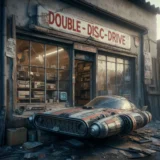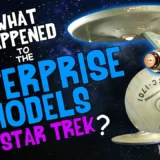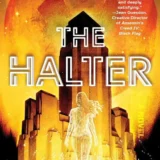
Hello, folks! Now that I’m back on my feet, I find that April’s here. A few days ago was April 1st, also known as April Fool’s Day. And while I may not be clever enough to come up with fun jokes for April Fool’s Day, I can at least appreciate the humor. There’s something about humor, about the joy of laughter, that makes me think about comedy every spring. Which is why this month I’m going to be exploring how speculative fiction and comedy intersect.
Comedic Stories vs. Stories with Humor
Comedy and tragedy are some of the oldest genre labels that can be applied. And like their newer cousins (“science fiction”, anyone?), their terrain is broad and their borders porous. Comedy can run the gamut from slapstick and pratfalls (The Three Stooges’ Have Rocket, Will Travel), to absurd parody (Douglas Adams’ The Hitchhiker’s Guide to the Galaxy
), all the way out to complex socioeconomic satire (Terry Pratchett’s Going Postal
). Between such tent pole examples we can find countless works which are less defined by their humor, but which nevertheless rely on it (John Scalzi’s Redshirts
or A. Lee Martinez’s The Automatic Detective
both come to mind).
So how does speculative fiction incorporate comedy? It’s a broad and perhaps over-generalized question, but I think that we can draw a distinction between stories that use humor to differing degree:
- Comedic Stories are specifically meant to be humorous (and yes, I know that author intentionality is a slippery critical slope). However, we can discern that intention from the centrality of their humor to the narrative. If we were to remove the comedy, their story falls apart.
- Stories with Humor do not use humor as narrative glue. There may be moments which make us laugh out loud, but removing the humorous elements would not cause the story’s overall narrative structure to collapse (though it might make the story less enjoyable).

would leave us with an anemic travel story. If we were to remove the humorous moments from Steven Brust’s Jhereg
we would still have an intellectually-engaging mystery (though it would definitely be a much weaker novel). But when we look at what are arguably the highest forms of satire in the field – Terry Pratchett in particular – their refinement of satiric technique means that by removing their humor we are left with exactly the kind of narrative that they are in fact satirizing. So these “seemingly distinct” categories are less disparate for all that, but they remain a good place for us to start our exploration.
Coming Up Next Week…
Next week, I’m going to start by taking a close look at the speculative fiction writer most-often linked to humor. Douglas Adams’ Hitchhiker’s Guide trilogy (all five books, with a sixth by Eoin Colfer) is a classic in the field, and such a canonical example that the Guardian published a sadly uncritical paean to celebrate Adams’ 61st birthday.
Much as I love Adams’ work, I think it deserves a closer exploration and a more careful comparison to those writers often grouped with him. Specifically, I believe that anyone who thinks Terry Pratchett has done for fantasy what Adams did for science fiction (as David Barnett claims in that Guardian piece) needs to re-read both oeuvres. Yet the details of this argument require us to actually explore how both giants in the field achieved their effects. And next week we kick that exploration off alphabetically, starting with Douglas Adams.
Chris Gerwel is a science fiction, fantasy, and horror writer. Raised in New Jersey, he spent ten years in Central & Eastern Europe in the market research industry, and today when he isn’t reading or writing speculative fiction, he works in the software industry. He lives in northern NJ, with a beautiful wife and a rambunctious puppy, and also writes the weekly blog The King of Elfland’s 2nd Cousin.












That Damon Knight-like definition is a pretty workable one, I think. Coming up with any kind of taxonomy for the discussion of humor is in and of itself difficult, and then if we try to merge it with genre semantics we're likely to just get a bit of a muddle.
I suspect that one of the best ways to explore it is to do so through the type of comedy that is employed. Comedy of the absurd (Douglas Adams) works very differently from parody (early Terry Pratchett, John Scalzi), which itself works differently from satire (later Pratchett, or James Morrow), and differently from fiction with comedic elements (Steven Brust, Tom Holt, A. Lee Martinez).
For a good cross-section, there's a recent anthology edited by Alex Shvartsman (full disclosure: Alex is a friend of mine) that I strongly recommend entitled Unidentified Funny Objects which collects 55 comedic SF/F/H short stories. Also, Alex has recently launched a Kickstarter campaign for a follow-up anthology (Unidentified Funny Objects 2) with new humorous stories from some awesome authors, as well.
Thanks for the recommendation. I try to keep an eye on the humorous SF market, but somehow that one slipped by unnoticed.
Chris, I look forward to reading the rest of the sequence. I once made an attempt at defining humorous SF and came up with something similar, "a science fiction story in which the central purpose is to elicit a humorous response from the reader." Then, of course, when it came to classifying individual works as either within the category or simply using some humor in the story, my hopes for a black and white dividing line turned gray (much like trying to define science fiction itself). I also considered treating it like an attribute which a story might partake of to varying degrees, but that wasn’t completely satisfactory either. In the end I’m afraid I end close to a vague Damon Knight like “humorous science fiction is what we point to when we say it.”